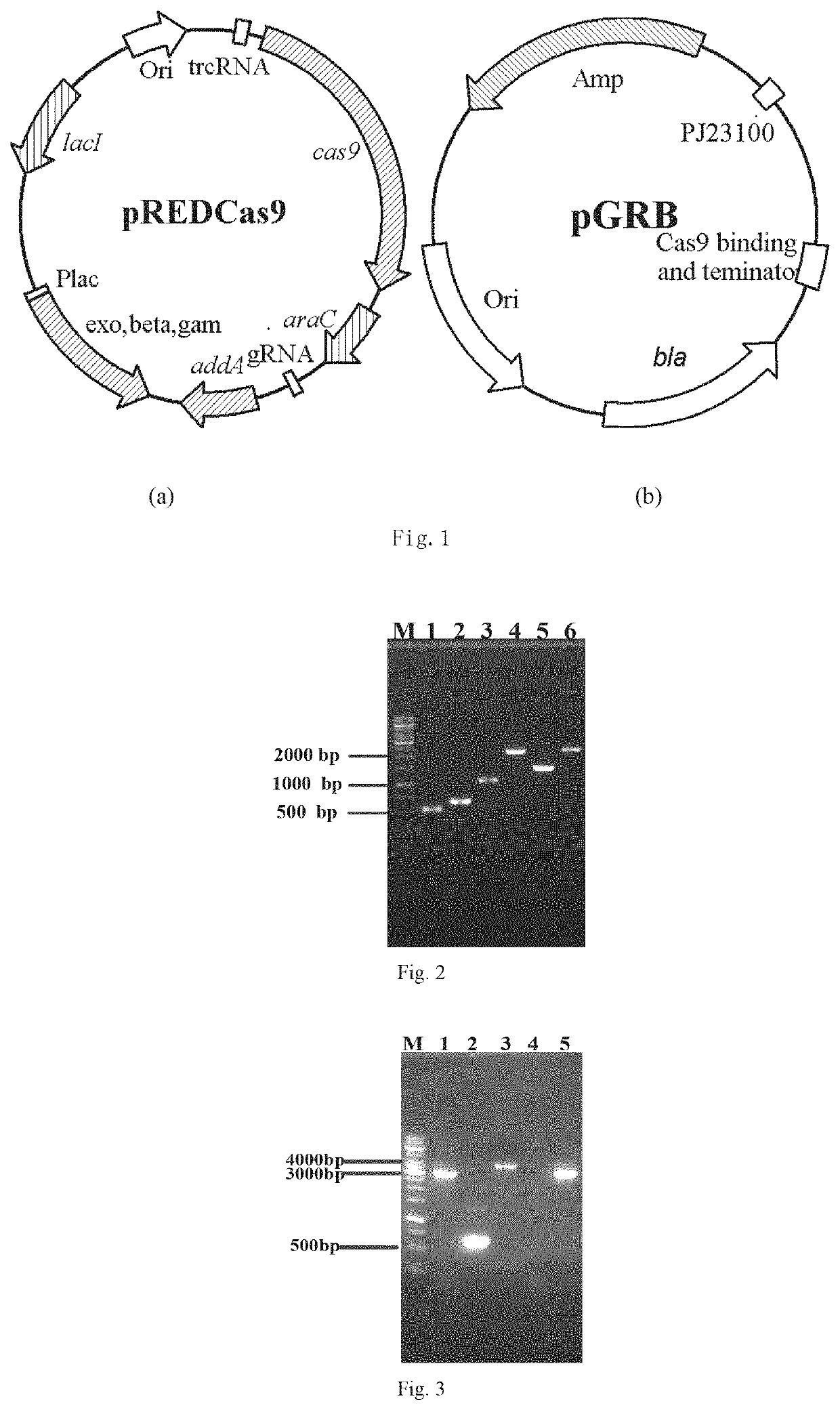Genetically engineered bacterium used for producing uridine with high-yield
a technology of uridine and genetic engineering, applied in the field of genetic engineering, can solve the problems of difficult to achieve the effect of high yield, difficult to achieve, and difficult to achieve the effect of uridine production, improved growth characteristics, and convenient for further character improvemen
- Summary
- Abstract
- Description
- Claims
- Application Information
AI Technical Summary
Benefits of technology
Problems solved by technology
Method used
Image
Examples
example 1
Construction of Strain E. coli UR11
[0050]1. The Method of Gene Editing
[0051]The gene editing method used in the invention refers to the literature, entitled “metabolic engineering of Escherichia coli using CRISPR-Cas9 meditated genome editing”, published in the journal of metabolic engineering in 2015 by Li Y, Lin Z, Huang C, et al. Two plasmids, pREDCas9 and pGRB, were used in this method and the plasmid profiles were shown in FIG. 1. pREDCas9 consists of the temperature sensitive pSC101 replication origin, spectinomycin resistance gene, Cas9 expression cassette, IPTG inducibleλ-Red recombination system and L-arabinose inducible gRNApGRB cassette. pGRB includes the promoter J23100, ampicillin resistance gene, the gRNA scaffold for Cas9 binding and a terminator derived from S. pyogenes, and the bla sequence.
[0052]The specific steps of this method are as follows:
[0053]1.1 Construction of Plasmid pGRB
[0054]Plasmid pGRB was constructed to transcribe corresponding gRNA that directs the ...
example 2
Method of Fermentative Producing Uridine by E. coli UR11
[0116](1) Shake-Flask Fermentation
[0117]Slant culture: a loop of thallus was scraped off from the strain deposit tube stored in −80° C., and spread evenly on the agar slant culture medium to culture for 12 h, then transferred into a second-generation agar slant to culture for 12 h.
[0118]Seed culture: a loop of thallus was inoculated into a 500 mL erlenmeyer flask with 30 mL seed medium, sealed with nine layers of gauze and cultured for 6-8 h at 37° C. and 200 rpm.
[0119]Shake-flask fermentation: the seed liquid is inoculated into a fermentation medium according to a inoculum size of 10-15% (a total volume is 30 mL), sealed with nine layers of gauze and cultured for 24-30 h at 37° C. and 200 rpm; The pH is maintained to be 7.0-7.2 by supplementing NH4OH, and a 60% (m / v) glucose solution is added for maintaining the fermentation when needed (the phenol red is used as an indicator, and that the color of the fermentation broth chang...
example 3
Fermentation Experiment in a 5 L Bioreactor by E. coli UR11
[0132]Slant culture: a loop of thallus was scraped off from the strain deposit tube stored in −80° C., and spread evenly on the agar slant culture medium to culture at 37° C. for 12 h, then transferred into an eggplant bottle to culture for 12 h.
[0133]Seed culture: transferring the cells cultured in the eggplant bottle into a 5 L bioreactor (Baoxing, Shanghai, China) containing 3 L seed medium. The pH was kept constant at 7.0 by automated addition of NH4OH (25%, v / v). Dissolved oxygen was maintained above 20% by variation of the stirrer speed and the aeration rate. The temperature was kept constant at 37° C. The seed cultures were continued until OD600 of the culture achieved approximately 12-15, and 500 mL of culture broth was retained for the fed-batch cultures.
[0134]Bioreactor fermentation: fed-batch cultures were carried out in a 5 L bioreactor containing 3 L medium in total. The pH was kept constant at 7.0 by automated ...
PUM
| Property | Measurement | Unit |
|---|---|---|
| final volume | aaaaa | aaaaa |
| final volume | aaaaa | aaaaa |
| temperature | aaaaa | aaaaa |
Abstract
Description
Claims
Application Information
 Login to View More
Login to View More - R&D
- Intellectual Property
- Life Sciences
- Materials
- Tech Scout
- Unparalleled Data Quality
- Higher Quality Content
- 60% Fewer Hallucinations
Browse by: Latest US Patents, China's latest patents, Technical Efficacy Thesaurus, Application Domain, Technology Topic, Popular Technical Reports.
© 2025 PatSnap. All rights reserved.Legal|Privacy policy|Modern Slavery Act Transparency Statement|Sitemap|About US| Contact US: help@patsnap.com



